#Freecodecamp seems to be fine for JavaScript
Explore tagged Tumblr posts
Photo
There are so, so, so many reasons why this incredibly fake story is incredibly fake. But I just keep reading the API technobabble and I can't stop laughing.
Mf out here bragging about how not only is their code unreadable and unmaintainable, but also their documentation is unreadable and undiscoverable. The problem that this creative writer has is that they need to be indispensable in this story, but unfortunately an indispensable programmer is uniquely gifted at making themself superfluous as quickly and efficiently as possible in as many contexts as possible.
The "nobody is familiar with Python" part is probably my favorite. Python is one of the easiest programming languages to learn. It's so easy that it's the language that engineers (real engineers like chemical engineers, biomedical engineers, material engineers, not software engineers developers) use to help them automate things in their work. Anyone who is familiar with any other programming language can pick up Python in under an hour. You who are familiar with zero programming languages could probably pick up a decent amount of Python in a month. Try it! It is probably easier than you think.
More reasons why this fake story is fake:
This is posted on r/antiwork. It's one of the subreddits infamous for fake stories of bad bosses
It's a multipart series. One of the tropes of fake Reddit stories is the escalating updates. Creative writers hear an encore and they keep going back for more
It's a bit ambiguous how long this person has been in industry, but given the context of missing multiple children's school functions, I think 10+ years of experience is a cautious estimate. That is long enough in software for you to be a team lead, if not a people manager yourself. This person should be training junior devs. They explicitly say that they aren't
Software is incredibly collaborative. There's no way a manager would turn down an offer to train new devs on the existing tooling
Moreover there's no way the code got push to production without several eyes on it. Most companies do either code reviews or pair programming or both. It makes no sense that zero other people understand what's going on with this code. Unless it's really buggy
The fact that someone tried to use it and it corrupted a CSV file (??) shows that it's actually really buggy. If the software was so good, anyone would be able to run it
That goes double for the documentation being so bad that nobody knows how to read it. The entire purpose of documentation is to explain how code works. You failed at your one job.
If the only documentation is something that's hard to find, that looks bad on OOP for two reasons: 1) Documentation is normally put inline next to the code precisely for the reason that it would be easy to find. Don't want to see what a nightmare their code with no inline docs looks like. 2) Their programming practices are so bad that their other documentation is hard to find. The program should have a file called README that either has all the documentation or tells you where to find all the documentation.
This violates NDA so bad
"Out of compliance" for what? Which regulation? Why do they have a deadline to regain compliance? They should already be suffering whatever fines or consequences or whatever for already being out of compliance. It would make more sense if they were at risk of being out of compliance if they didn't implement XYZ by January
There's a lot of weird wording here that indicates a lack of familiarity with software: "complex API", "documentation library", "single threaded". That's not how we use those terms

If you're a software developer for a company the size of Disney (ABC's parent) then what OOP asked for is your starting salary straight out of undergrad. Def not a raise for a senior engineer who's been in industry 10+ years. Def not more than their manager is making.
At a company that size, your direct manager has no ability to decide what the terms of your hiring agreement would be. Def not over text. It would need to go through HR and probably legal as well
"Legal checked the contract and there's a clause stating" lmao get outta here!
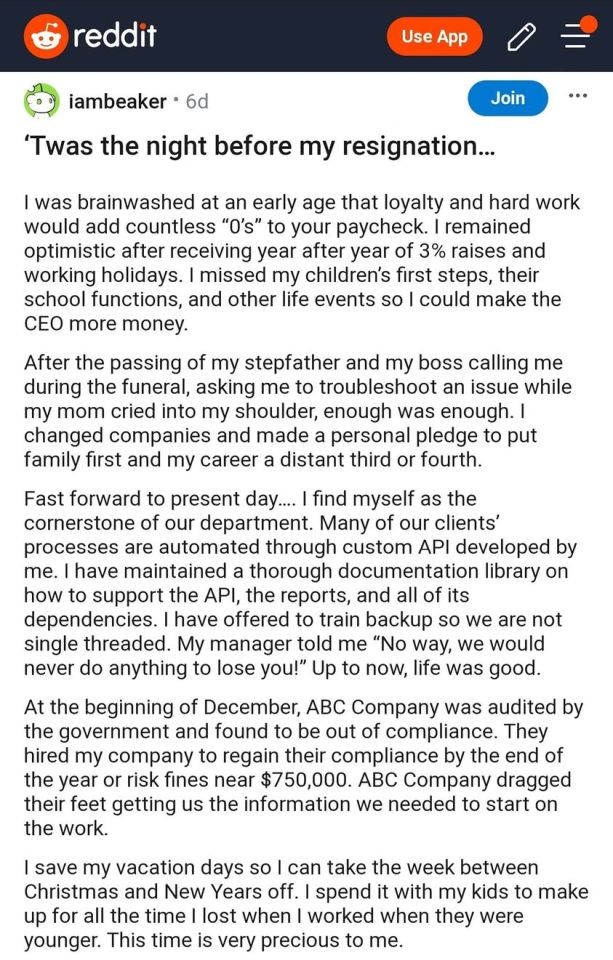
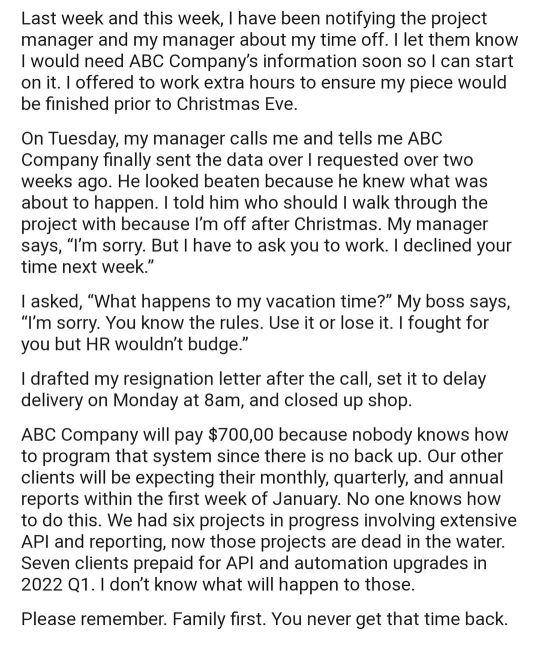
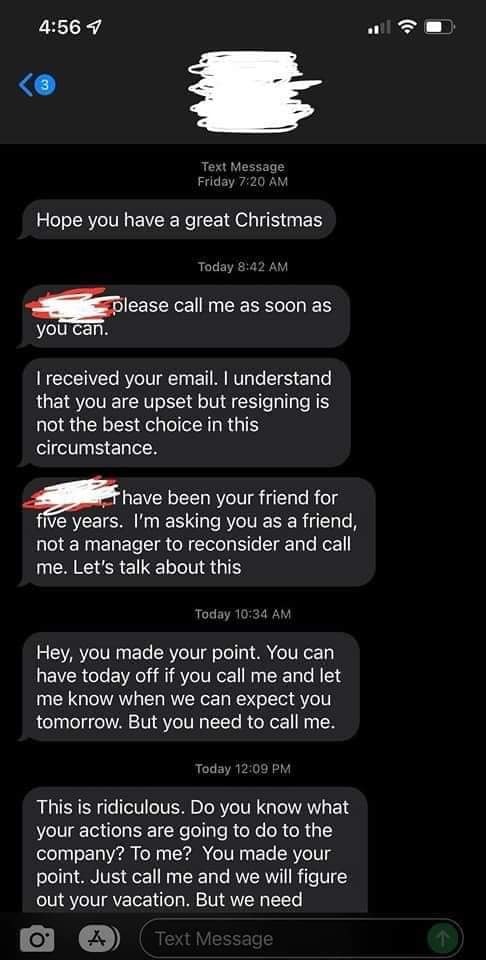
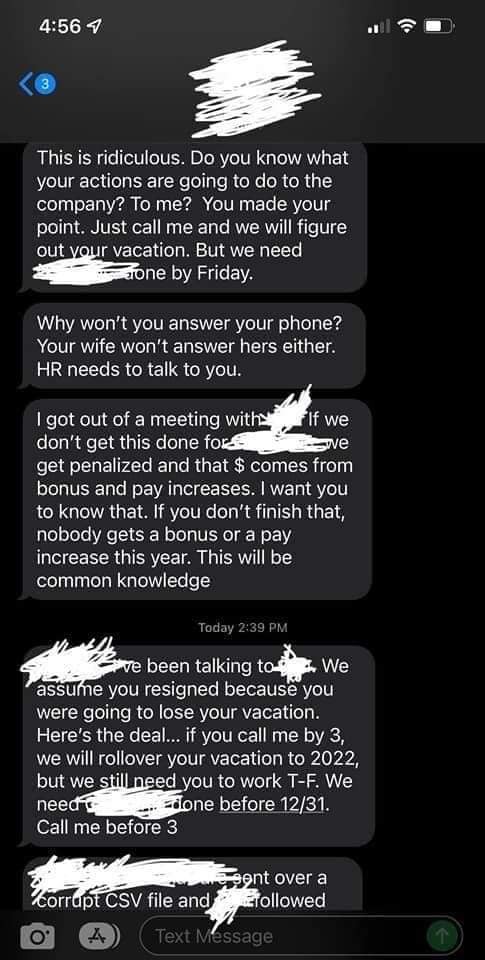
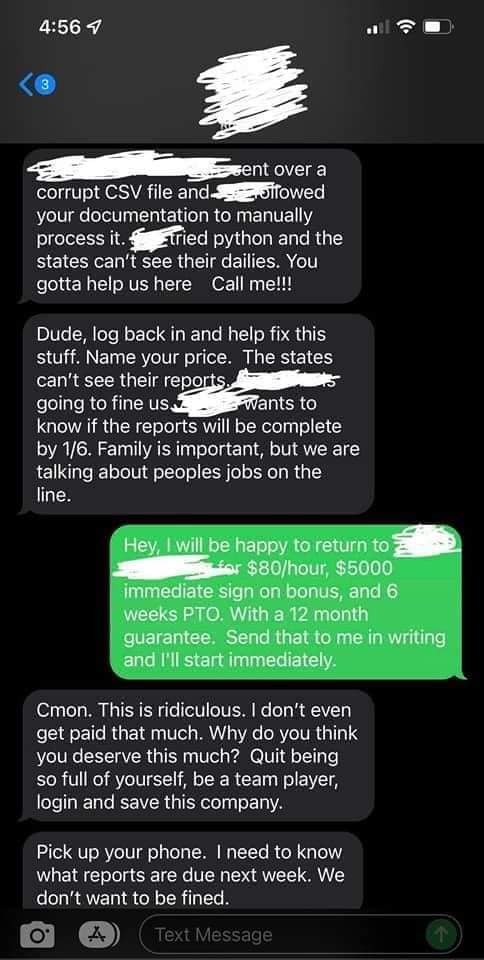
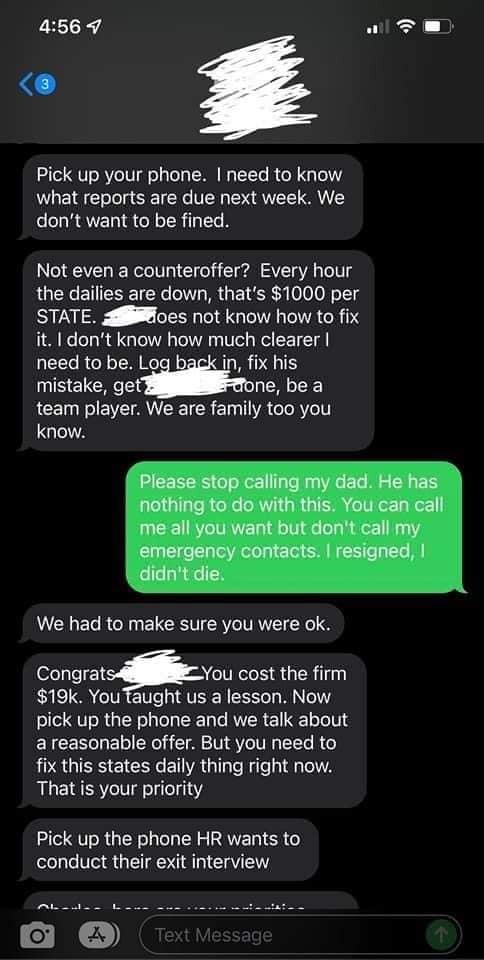
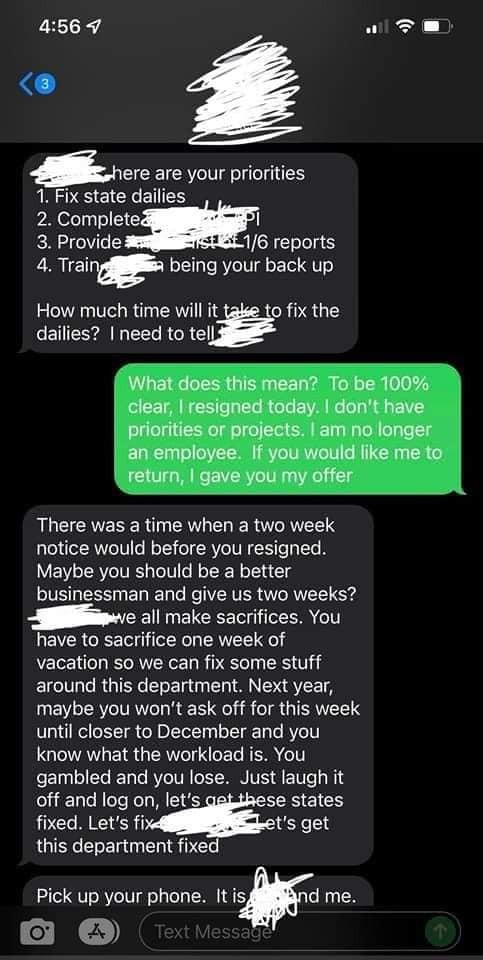
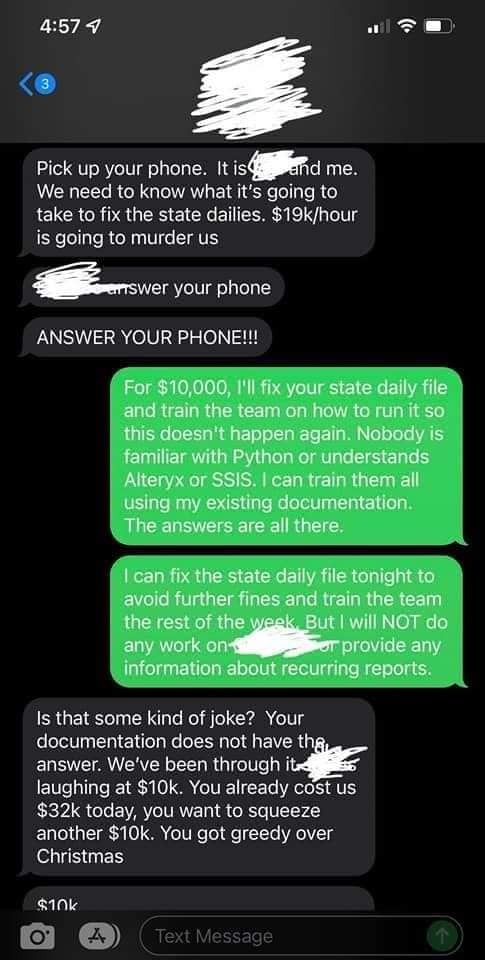
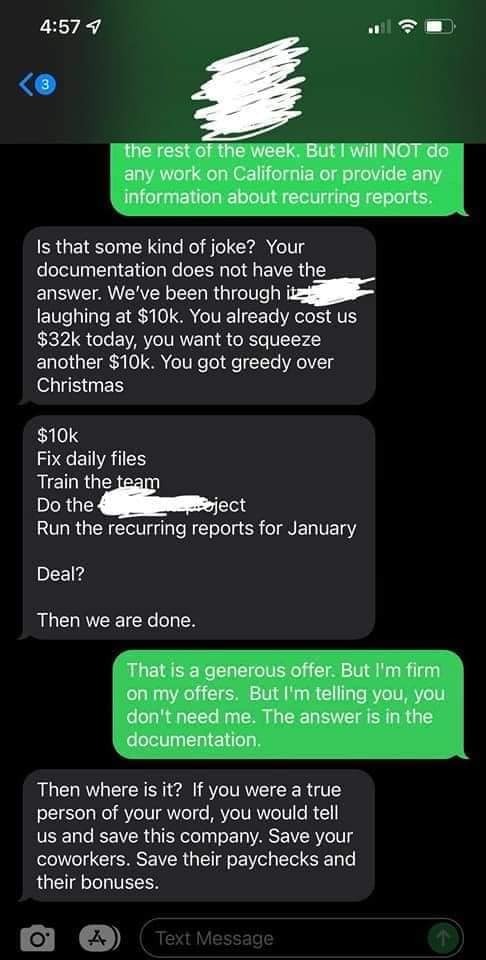

#Reddit creative writing exercise#codeblr#progblr#You can learn almost any programming language for free online if you first learn the essential software engineer skill of#googling what you need#Im hesitant to pick a specific python tutorial because I havent needed a python tutorial in over a decade#I dont know which of the modern ones are good#Freecodecamp seems to be fine for JavaScript#Similar but imo superior language to start with
247K notes
·
View notes
Text
The best apps and sites to learn how to code
Maybe this is the time for that career change. (Tyler Franta / Unsplash/)
If you have some extra time on your hands and you want to do something productive, you might want to learn a new skill. Consider coding—it’s easy to get started, everything you need is online (oftentimes for free), you can make a career out of it, and the possibilities are endless. Literally.
There are a lot of online resources and apps that can help you go from “total noob” to “master coder.” Here are some of the best we could find out there, but rather than putting all your eggs in one basket, we'd highly recommend using more than one platform at a time.
When it comes to learning to code, there isn't a 'one-stop shop' so don't be afraid to pick a couple of apps, try them, and take what you need from the parts that work for you
1. Mimo
You may have come across those language learning apps that get you to practice for five or 15 minutes every day, and Mimo takes the same approach to coding. Create a free account, decide how much time you want to devote to your new project daily, and then follow the exercises as instructed.
Mimo is certainly intuitive and straightforward to follow (even for beginners) and it starts with the very basics of coding. You can choose between several coding languages (HTML, CSS, JavaScript, Python, Java, Swift, C++, SQL, and PHP), and the platform immediately shows how the code runs as you write it. This is very practical if there’s something more specific you want to pick up. As well as typing out code, you get exercises where you have to spot mistakes, or drag script elements into the right order, so it keeps the learning experience varied.
There's no web version of Mimo, so it's perfect if you just want to learn in short bursts on your phone or tablet. You can also opt for a Pro subscription ($9 a month) which gets you access to more advanced lessons and tutorials.
Mimo (freemium) is available for Android and iOS.
2. Codecademy
Codecademy combines step-by-step lessons on your browser with optional exercises you can do on mobile, so it allows you to keep up with your coding practice wherever you are. While it’s not the most in-depth or thorough virtual coding school out there, Codecademy is a very useful introduction to the basics, with an intuitive and friendly interface, and explanations of terms and syntax as you go.
A wide variety of app and web programming languages are covered as well: HTML, CSS, JavaScript, Java, Python, Ruby, C++, PHP, Go, Swift, SQL and more. The portal can guide you through specific 'career paths' with a clear progression from one lesson to the next, but it's also possible to just browse around and pick and choose what you want to do—there's a wealth of material at your disposal.
You can get started with Codecademy and work through 25 courses for free. Sign up for a Pro account—$20 a month, billed annually—and you can access 65 courses, tackle real world projects, and unlock hundreds of extra exercises. You can give the free package a try and then opt for the paid-for version if you decide you actually want to make a career out of coding.
Codecademy (freemium) is available for Android and iOS, and on the web.
3. Programming Hero
Are you a total coding noob? No problem. Programming Hero is beginner friendly. (David Nield/)
If you're an absolute beginner and want to move at your own pace, then Programming Hero could be just what you're looking for. It's very friendly, with jargon-free language and coding challenges that are turned into mini-games, so you never feel like you're slogging through difficult concepts.
As you work your way up through the different challenges, the platform will help you make your own game. You'll still be a long way from being able to code your own from scratch, though, but you will at least understand the fundamentals behind coding, and some of the syntax and commands you can use.
Programming Hero is a nice blend of coding exercises and quizzes designed to test your knowledge, and it covers coding languages including HTML, CSS, JavaScript, and SQL. All the basic material is free and extends quite far, but for intermediate and advanced lessons you'll need to pay $10 per month for a premium account.
Programming Hero (freemium) available for Android and iOS.
4. Grasshopper
Grasshopper is developed by Google, and is one of the more accessible ways for beginners to start coding in this list—you can dive in and be typing and arranging commands in minutes. While it focuses exclusively on JavaScript, the concepts that the platform covers (including loops and functions) apply to any programming language.
Coding exercises are set up like puzzles to solve, with a well-judged balance of instructions, actual coding, and end results on the screen. To begin with, you just have to move elements around on a screen before you actually get to type anything, and the progression speed is nice and steady.
The exercises are short, so you can jump in and do one whenever you have a spare five minutes on whatever device you use—Grasshopper will sync your progress automatically.
The app won't take you as far as some other code teaching platforms can—you won't get a job off the back of using Grasshopper—but it's a really friendly introduction if you’re totally new to this, and it's completely free to use.
Grasshopper (free) available for Android and iOS, and on the web.
5. Code Avengers
There’s a wide range of paths available on Code Avengers—from exercises suitable for kids to courses that can help you get an actual job in coding.
The coding languages covered are HTML, CSS, JavaScript, and Python, with some extra web development and design tutorials thrown in (covering more general topics). The layout is easy to get to grips with, and includes teaching instructions, code samples, and the end result of your coding all together on the same screen.
Code Avengers is one of the most in-depth and most informative sites we've come across, teaching you not just how to do something, but also why you're doing it. This makes the platform really comprehensive, but it's not free—pricing starts at $20 a month if you pay for a whole year at once, though you can sign up for a 7-day free trial to make sure Code Avengers suits you. If you don’t want to make a career out of coding or you’re only learning for fun, you’re probably better off going for another platform.
Code Avengers (from $20 a month) is available on the web.
6. Treehouse
Treehouse is for the serious coder. (David Nield/)
Treehouse is based largely around videos and programming exercises, and although its entry point is still accessible enough for beginners, the platform is aimed at people who are seriously thinking about a career in coding. You’ll get a 7-day free trial but after that, lessons start at $25 a month, so Treehouse is not the best idea if you just want to play around with a few basics.
Users go through a very clear progression of tutorials and exercises, with a neat sandbox feature called Workspaces, where you can try out experiments of your own. The platform may come across as too formal or too heavy for some (the free trial will help you work this out), but it's a comprehensive learn-to-code package that covers HTML, CSS, JavaScript, Python, PHP, and more.
Treehouse can teach you how to code for iOS and Android, but ironically, courses are only available through your web browser on a computer.
Treehouse (from $25 a month) on the web.
7. Udemy
While Udemy may seem a bit chaotic and has pricing varies a lot, it's still one of the best online resources for someone looking to learn to code. It goes from the basics all the way to the most complex programming concepts, and in that sense is on a par with platforms such as Treehouse.
If you’re unfamiliar with the portal, you should know that Udemy works as a sort of online marketplace, in which anyone can create a course. This means teaching styles differ quite a bit—this is great if you find a teacher you connect with, but problematic if you don’t. Content quality can also differ, but most of the material on this platform is top notch.
Udemy courses cover a whole range of topics, but as far as coding goes you've got everything from web and mobile development, to artificial intelligence. There’s a really big stack of stuff to go through. Unlike other platforms on this list, teachers on Udemy present tutorials in video form and offer answers to any questions you might have. Having a person on the other end—even if it’s not a one-on-one learning scenario—requires a fair degree of concentration and commitment so you should consider that when signing up for a Udemy class.
And since there's no free trial—just a preview option and a 30-day money back guarantee—you should definitely check out reviews and comments from past users before you sign up for a class.
Udemy (from $10 and up per course) is available on Android and iOS, and on the web.
8. Dash
Dash offers shorter courses than other platforms on this list, and has a relatively narrow focus, concentrating on HTML, CSS, and JavaScript for web development. But that's not necessarily a disadvantage if you're looking for a brief overview of the fundamentals of these specific coding languages.
The Dash interface certainly impresses, with a coding window on one side and a nice big preview of your finished webpage on the other. It has five well laid out and easy to follow projects, including a responsive blog, a small business website or even a browser game that looks great on desktop or mobile. On each one, you can see instantly how your code affects the live site, making learning much more interactive.
It's very much an 'on rails' experience—you won't be able to build any website or browser game you like without more learning, but it's a fine introduction to the basics.
Dash (free) is available on the web.
9. FreeCodeCamp
Free coding app. That's it. That's the caption. (David Nield/)
FreeCodeCamp is a huge collection of more than 6,000 tutorials and, as the name suggests, they're all completely free to use. They cover HTML, CSS, JavaScript, Python, React, Java, SQL, and several other coding languages, and if you need help at any point, then there are some busy forums packed with pointers and advice.
There are some drawbacks, though. FreeCodeCamp isn't quite as polished in terms of the interface and the course structure as some of the other entries on our list, and you don't get as much hand-holding. Also, the platform doesn't offer mobile apps either, so it's all done through your browser on a computer.
Still, these are all minor details in our opinion, and not at all deal breakers when it comes to choosing a code-teaching platform. FreeCodeCamp is still very comprehensive, available for free, and easy enough at the beginning for anyone to pick up.
FreeCodeCamp (free) is available on the web.
0 notes
Text
The best apps and sites to learn how to code
Maybe this is the time for that career change. (Tyler Franta / Unsplash/)
If you have some extra time on your hands and you want to do something productive, you might want to learn a new skill. Consider coding—it’s easy to get started, everything you need is online (oftentimes for free), you can make a career out of it, and the possibilities are endless. Literally.
There are a lot of online resources and apps that can help you go from “total noob” to “master coder.” Here are some of the best we could find out there, but rather than putting all your eggs in one basket, we'd highly recommend using more than one platform at a time.
When it comes to learning to code, there isn't a 'one-stop shop' so don't be afraid to pick a couple of apps, try them, and take what you need from the parts that work for you
1. Mimo
You may have come across those language learning apps that get you to practice for five or 15 minutes every day, and Mimo takes the same approach to coding. Create a free account, decide how much time you want to devote to your new project daily, and then follow the exercises as instructed.
Mimo is certainly intuitive and straightforward to follow (even for beginners) and it starts with the very basics of coding. You can choose between several coding languages (HTML, CSS, JavaScript, Python, Java, Swift, C++, SQL, and PHP), and the platform immediately shows how the code runs as you write it. This is very practical if there’s something more specific you want to pick up. As well as typing out code, you get exercises where you have to spot mistakes, or drag script elements into the right order, so it keeps the learning experience varied.
There's no web version of Mimo, so it's perfect if you just want to learn in short bursts on your phone or tablet. You can also opt for a Pro subscription ($9 a month) which gets you access to more advanced lessons and tutorials.
Mimo (freemium) is available for Android and iOS.
2. Codecademy
Codecademy combines step-by-step lessons on your browser with optional exercises you can do on mobile, so it allows you to keep up with your coding practice wherever you are. While it’s not the most in-depth or thorough virtual coding school out there, Codecademy is a very useful introduction to the basics, with an intuitive and friendly interface, and explanations of terms and syntax as you go.
A wide variety of app and web programming languages are covered as well: HTML, CSS, JavaScript, Java, Python, Ruby, C++, PHP, Go, Swift, SQL and more. The portal can guide you through specific 'career paths' with a clear progression from one lesson to the next, but it's also possible to just browse around and pick and choose what you want to do—there's a wealth of material at your disposal.
You can get started with Codecademy and work through 25 courses for free. Sign up for a Pro account—$20 a month, billed annually—and you can access 65 courses, tackle real world projects, and unlock hundreds of extra exercises. You can give the free package a try and then opt for the paid-for version if you decide you actually want to make a career out of coding.
Codecademy (freemium) is available for Android and iOS, and on the web.
3. Programming Hero
Are you a total coding noob? No problem. Programming Hero is beginner friendly. (David Nield/)
If you're an absolute beginner and want to move at your own pace, then Programming Hero could be just what you're looking for. It's very friendly, with jargon-free language and coding challenges that are turned into mini-games, so you never feel like you're slogging through difficult concepts.
As you work your way up through the different challenges, the platform will help you make your own game. You'll still be a long way from being able to code your own from scratch, though, but you will at least understand the fundamentals behind coding, and some of the syntax and commands you can use.
Programming Hero is a nice blend of coding exercises and quizzes designed to test your knowledge, and it covers coding languages including HTML, CSS, JavaScript, and SQL. All the basic material is free and extends quite far, but for intermediate and advanced lessons you'll need to pay $10 per month for a premium account.
Programming Hero (freemium) available for Android and iOS.
4. Grasshopper
Grasshopper is developed by Google, and is one of the more accessible ways for beginners to start coding in this list—you can dive in and be typing and arranging commands in minutes. While it focuses exclusively on JavaScript, the concepts that the platform covers (including loops and functions) apply to any programming language.
Coding exercises are set up like puzzles to solve, with a well-judged balance of instructions, actual coding, and end results on the screen. To begin with, you just have to move elements around on a screen before you actually get to type anything, and the progression speed is nice and steady.
The exercises are short, so you can jump in and do one whenever you have a spare five minutes on whatever device you use—Grasshopper will sync your progress automatically.
The app won't take you as far as some other code teaching platforms can—you won't get a job off the back of using Grasshopper—but it's a really friendly introduction if you’re totally new to this, and it's completely free to use.
Grasshopper (free) available for Android and iOS, and on the web.
5. Code Avengers
There’s a wide range of paths available on Code Avengers—from exercises suitable for kids to courses that can help you get an actual job in coding.
The coding languages covered are HTML, CSS, JavaScript, and Python, with some extra web development and design tutorials thrown in (covering more general topics). The layout is easy to get to grips with, and includes teaching instructions, code samples, and the end result of your coding all together on the same screen.
Code Avengers is one of the most in-depth and most informative sites we've come across, teaching you not just how to do something, but also why you're doing it. This makes the platform really comprehensive, but it's not free—pricing starts at $20 a month if you pay for a whole year at once, though you can sign up for a 7-day free trial to make sure Code Avengers suits you. If you don’t want to make a career out of coding or you’re only learning for fun, you’re probably better off going for another platform.
Code Avengers (from $20 a month) is available on the web.
6. Treehouse
Treehouse is for the serious coder. (David Nield/)
Treehouse is based largely around videos and programming exercises, and although its entry point is still accessible enough for beginners, the platform is aimed at people who are seriously thinking about a career in coding. You’ll get a 7-day free trial but after that, lessons start at $25 a month, so Treehouse is not the best idea if you just want to play around with a few basics.
Users go through a very clear progression of tutorials and exercises, with a neat sandbox feature called Workspaces, where you can try out experiments of your own. The platform may come across as too formal or too heavy for some (the free trial will help you work this out), but it's a comprehensive learn-to-code package that covers HTML, CSS, JavaScript, Python, PHP, and more.
Treehouse can teach you how to code for iOS and Android, but ironically, courses are only available through your web browser on a computer.
Treehouse (from $25 a month) on the web.
7. Udemy
While Udemy may seem a bit chaotic and has pricing varies a lot, it's still one of the best online resources for someone looking to learn to code. It goes from the basics all the way to the most complex programming concepts, and in that sense is on a par with platforms such as Treehouse.
If you’re unfamiliar with the portal, you should know that Udemy works as a sort of online marketplace, in which anyone can create a course. This means teaching styles differ quite a bit—this is great if you find a teacher you connect with, but problematic if you don’t. Content quality can also differ, but most of the material on this platform is top notch.
Udemy courses cover a whole range of topics, but as far as coding goes you've got everything from web and mobile development, to artificial intelligence. There’s a really big stack of stuff to go through. Unlike other platforms on this list, teachers on Udemy present tutorials in video form and offer answers to any questions you might have. Having a person on the other end—even if it’s not a one-on-one learning scenario—requires a fair degree of concentration and commitment so you should consider that when signing up for a Udemy class.
And since there's no free trial—just a preview option and a 30-day money back guarantee—you should definitely check out reviews and comments from past users before you sign up for a class.
Udemy (from $10 and up per course) is available on Android and iOS, and on the web.
8. Dash
Dash offers shorter courses than other platforms on this list, and has a relatively narrow focus, concentrating on HTML, CSS, and JavaScript for web development. But that's not necessarily a disadvantage if you're looking for a brief overview of the fundamentals of these specific coding languages.
The Dash interface certainly impresses, with a coding window on one side and a nice big preview of your finished webpage on the other. It has five well laid out and easy to follow projects, including a responsive blog, a small business website or even a browser game that looks great on desktop or mobile. On each one, you can see instantly how your code affects the live site, making learning much more interactive.
It's very much an 'on rails' experience—you won't be able to build any website or browser game you like without more learning, but it's a fine introduction to the basics.
Dash (free) is available on the web.
9. FreeCodeCamp
Free coding app. That's it. That's the caption. (David Nield/)
FreeCodeCamp is a huge collection of more than 6,000 tutorials and, as the name suggests, they're all completely free to use. They cover HTML, CSS, JavaScript, Python, React, Java, SQL, and several other coding languages, and if you need help at any point, then there are some busy forums packed with pointers and advice.
There are some drawbacks, though. FreeCodeCamp isn't quite as polished in terms of the interface and the course structure as some of the other entries on our list, and you don't get as much hand-holding. Also, the platform doesn't offer mobile apps either, so it's all done through your browser on a computer.
Still, these are all minor details in our opinion, and not at all deal breakers when it comes to choosing a code-teaching platform. FreeCodeCamp is still very comprehensive, available for free, and easy enough at the beginning for anyone to pick up.
FreeCodeCamp (free) is available on the web.
0 notes
Text
I Finished the Entire freeCodeCamp Curriculum in 1 Month (and Recorded Everything)
One month ago I embarked on a challenge that many people told me was insane. I set out to conquer the entire freeCodeCamp curriculum. All while live streaming everything on my YouTube channel.
29 days, 56 Live Streams and 72 hours of live streams later... I did it! 🤩
First a Disclaimer
I'm a professional software engineer. I've been coding since 2013. And I had previous experience working with all of the technologies covered in freeCodeCamp's curriculum.
So this was way easier for me than it would be for most people. Most people spend years earning these certifications.
Remember: It's not about how much time it takes you to complete freeCodeCamp's curriculum – it's about what you are learning along the way.
I created this series as a guide for anyone who gets stuck during the curriculum, and wants to watch how a relatively experienced software engineer would solve challenges and build projects.
This series of 72 hours of video covers the following topics:
HTML
CSS
Flexbox
CSS Grid
JavaScript
Bootstrap
React
Redux
NodeJS
Express
MongoDB
Mongoose
and more...
And I also build 30 projects along the way.
Below you'll find a list with all the videos nicely structured by certifications. 👍
How did this crazy month of my life get started?
I've been planning to do this challenge for a while now. But it always seemed to be a HUGE one, which would take a lot of time to complete.
Apparently it didn't take months, as I initially thought. (And I'll tell you why in a moment.)
Before I started this challenge I ran this idea by freeCodeCamp founder Quincy Larson to see whether he thought that this was something that could benefit the developer community. He was very encouraging.
freeCodeCamp has a "learn in public" culture, and a lot of people post their projects on the forum and on GitHub for feedback. And an increasing number of people live-stream themselves building these projects, too.
Quincy said not to worry about "spoiling" any of the challenges or projects. These are all the equivalent of "open notes tests." Students must write their own code, but they can look at other people's solutions for inspiration if they want.
Why Did I Choose freeCodeCamp's Certifications for This Challenge?
I have always recommended freeCodeCamp's curriculum to people who want to start learning web development.
Why? Well, the answer is very simple: it's the best free resource to get up and running with web development, in my opinion.
Now, even though it's a very good resource, people tend to quit along the way because they start to hit different roadblocks... and that's sad. 😔
We want more people to finish the curriculum!
And here is where the Conquering freeCodeCamp's Curriculum challenge starts to shine. It gives everyone a follow-along playlist of videos in which I personally go through the entire curriculum, explaining what I'm thinking with each step I take. I also added my own comments and "bonus" explanations.
Every section on freeCodeCamp is covered in a single video. There are a total of 56 videos. (See below a list of all)
My background and experience
I started to learn how to code in 2013. Since then I've been a freelancer, I had multiple jobs and last year I started to write articles on my blog and started to create YouTube coding tutorials (feel free to subscribe if you like these type of videos - shameless plug 😄).
It is safe to say that I already knew most part of what is to learn on the platform, which gave me an advantage on conquering the curriculum in a month, BUT, don't let this intimidate you...
No matter your experience, no matter if it takes you 2-3-6 months or 1 year to complete the curriculum, just do it. I promise that you won't regret doing it.
I also worked A LOT to put out these Live Streams. Some days I even recorded more than 5 hours and I had a day in which I did 8 Live Streams completing one entire certification in that day... 😅
Why did I do that?
Well... most people would say that I'm either crazy or either a robot.
I'm not a robot, but maybe a bit crazy... yes. 😂
The reason why I pushed so hard was because I had plans to go in a vacation and I wanted to have this all out before going. (Well... the vacation got canceled, but I'm still happy that I had this done.)
And also, to be honest, my craziness to do challenges fast also played a role in this. For some reason I wanted to finish this in a month, but don't ask me why because I don't really know 😅.
Probably because I thought that this would be a new world record or something, although I haven't checked for that so... I don't really know if it is or not. Quincy should tell me, haha.
Conquering freeCodeCamp - All the Recordings
Below you can find a list with all of the recordings - 56 in total.
Keep in mind that all of these were recorded in a series of Live Streams, so you might hear me talk with the chat, I will take some breaks sometimes to analyse and even struggle to find some solutions 😅 - which is perfectly fine!
I did Live Streams instead of "planned recordings" because I wanted it to be as close to real life as possible. This is probably what you'll have to deal with too, so I think it's of a greater value this way than it would have been to just show you the solutions.
Also note that it's perfectly fine to take a break once you are stuck in a challenge. Just leave it for a couple of hours, even a day, and you'll see a great progress when you come back later to the challenge.
Feel free to join our discord server if you want to follow along doing the challenge with other people!
Alright, enough talking, errmmm writting... here are all of the recordings. Enjoy! 😃
Responsive Web Design Certification
Basic HTML and HTML5 - Live Stream #1 Basic CSS - Live Stream #2 Applied Visual Design - Live Stream #3 Accessibility and RWD Principles - Live Stream #4 Flexbox and CSS Grid - Live Stream #5
Projects
Build a Tribute Page (for Brad Traversy) - Live Stream #6 Build a Survey Form - Live Stream #7 Build a Product Landing Page - Live Stream #8 Build a Technical Documentation Page - Live Stream #9 Build a Personal Portfolio Webpage - Live Stream #10
JavaScript Algorithms and Data Structures Certification
Basic JavaScript (Part 1) - Live Stream #11 Basic JavaScript (Part 2) - Live Stream #12 JavaScript ES6 - Live Stream #13 Regular Expressions - Live Stream #14 JavaScript Debugging - Live Stream #15 JavaScript Basic Data Structures - Live Stream #16 JavaScript Basic Algorithm Scripting - Live Stream #17 JavaScript OOP - Live Stream #18 JavaScript Functional Programming - Live Stream #19 JavaScript Intermediate Algorithm Scripting (Part 1) - Live Stream #20 JavaScript Intermediate Algorithm Scripting (Part 2) - Live Stream #21 JavaScript Algorithms and Data Structures Projects - Live Stream #22
Front End Libraries Certification
CSS Bootstrap - Live Stream #23 jQuery - Live Stream #24 SASS - Live Stream #25 ReactJS - Live Stream #26 Redux - Live Stream #27 React and Redux - Live Stream #28
Projects
Build a Random Quote Machine - Live Stream #29 Build a Markdown Previewer - Live Stream #30 Build a Drum Machine - Live Stream #31 Build a Calculator - Live Stream #32 Build a Pomodoro Clock - Live Stream #33
Data Visualization Certification
Data Visualization with D3 - Live Stream #34 JSON APIs and Ajax - Live Stream #35 Visualize Data with a Bar Chart - Live Stream #36
Projects
Visualize Data with a Scatterplot Graph - Live Stream #37 Visualize Data with a Heat Map - Live Stream #38 Visualize Data with a Choropleth Map - Live Stream #39 Visualize Data with a Treemap Diagram - Live Stream #40
APIs and Microservices Certification
Managing Packages with NPM - Live Stream #41 Basic Node and Express - Live Stream #42 Mongo and Mongoose - Live Stream #43
Projects
Timestamp Microservice - Live Stream #44 Request Header Parser Microservice - Live Stream #45 URL Shortener Microservice - Live Stream #46 Exercise Tracker - Live Stream #47 File Metadata Microservice - Live Stream #48
Information Security and Quality Assurance Certification
Information Security with HelmetJS - Live Stream #49 Quality Assurance and Testing with Chai - Live Stream #50 Advanced Node and Express - Live Stream #51
Projects
Metric-Imperial Converter - Live Stream #52 Issue Tracker - Live Stream #53 Personal Library - Live Stream #54 Stock Price Checker - Live Stream #55 Anonymous Message Board - Live Stream #56
What's next for me?
I will continue to create coding tutorials on my YouTube Channel as one of my main goals for 2020 is to reach 100,000 subscribers. (A crazy goal, I know, but... I think it's possible! What do you think? 😃)
I'm also waiting for the new Python certifications on freeCodeCamp to be released which I'm planning to go over too in a series of Live Streams.
Alongside these, you'll also find me doing other Live Coding series. The latest series which I created, CodeWars.js, is very useful if you want to learn more about how to solve different Coding Challenges using JavaScript.
Feel free to subscribe to my YouTube channel if you want to follow along with my journey. Also you can follow me on Twitter as I'm pretty active there.
I hope you found this article interesting!
Happy Coding! 😇
via freeCodeCamp.org https://ift.tt/39UMWEQ
0 notes